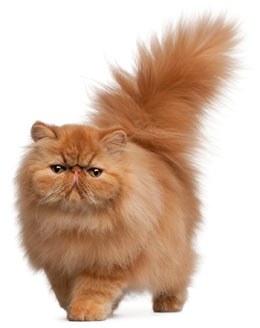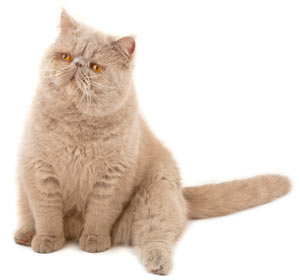Why Does My Cat's Rear End Smell Bad?

Cats are clean creatures. That's what everyone says and you know it's true because you see your cat cleaning himself all of the time. So what's with the terrible odor that has you asking "Why does my cat's rear end smell bad?" There are a number of reasons that you could be noticing a bad smell from your cat's behind.
Mats Can Cause Rear End Odor in Cats
If there are mats in the fur around your cat's rectum and genitals, you will notice a bad odor right away. The matted hair collects urine and sometimes feces that should be falling away from his body. This will make him stinky. Mats can occur for a few reasons:
- Your cat's fur may be prone to matting. This is especially true of long-haired cats such as Persians. These cats need daily brushing of their entire bodies, paying close attention to the back side, in order to keep painful and unhygienic mats from forming.
- A wound may be present in that area. If your cat has a scrape or laceration in the area under the tail, the surrounding fur may stick to it and create a mat.
- Your cat may develop mats if he stops grooming. This may occur if your cat becomes so heavy that it is difficult for him to physically reach his rear end to groom it. You may also see him stop grooming well if he is sick. Older cats with arthritis may stop grooming, as well, and start to develop mats.
Urinary Tract Infection Can Cause a Smelly Cat
Your cat may have a bad odor coming from his rear end if he has a urinary tract infection. The bacteria causing the infection can cause your cat's urine to smell bad. It may also cause your cat to feel the urge to urinate frequently. You may see urinary accidents around the house and some urine may dribble out onto the fur and skin around the urethra. This may result in you noticing a bad smell from his rear end. If you suspect that your cat may have a urinary tract infection, make an appointment with your veterinarian right away. These infections are painful for cats and, in male cats, can even cause a urinary blockage, which is an emergency situation.
Arthritis Can Cause a Stinky Kitty
An older cat may experience joint aches and pains related to arthritis. This can make it more difficult for him to reach certain areas of his body to groom them well and one of these is his rear end. As a result, you may start to notice a urine or feces odor. Older cats sometimes need some help with grooming. Increasing the frequency of brushings to avoid matting and using baby wipes around his rear end will help your cat remain comfortable as he ages. NEVER give your cat any over-the-counter medications if you suspect arthritis pain. Cats can be killed from small doses of human medications. Contact your veterinarian instead.

Being Overweight Can Cause a Stinky Cat Rear End
A cat that becomes overweight may develop odor coming from the rear end for one or more of the following reasons:
- As discussed above, an overweight cat may develop mats on his rear end that catch urine or feces.
- A cat with a weight problem may have skin and fat folds around his rectum and genitals that catch urine and are even more difficult for him to clean.
- Urine that sits on the skin and isn't cleaned off by your cat attracts bacteria that cause even more odor and may result in an uncomfortable skin infection.
As with an older cat, an overweight cat needs more help with grooming. Daily cleaning with baby wipes around his rectum and genitals as well as in any folds he may have will help keep him odor and infection free. Try to help your overweight cat lose some weight with extra play and fewer treats. Ask your veterinarian for suggestions on food type and amount.
A Cat's Anal Glands Can Be Stinky
There are scent glands just inside the rectum of cats. These are normally expressed during defecation, but sometimes they are expressed if your cat becomes frightened or wants to mark territory. Anal gland contents have a very strong, foul scent. Sometimes, they can become infected, and this can lead to leaking of anal gland contents or even an infection and abscess of the anal gland. These conditions can all cause a very bad smell from your cat's rear end. If you suspect that your cat has an anal gland problem, it is important to take him to the veterinarian right away.
Diarrhea Can Cause a Stinky Cat
If your cat has diarrhea, it is sometimes hard for him to keep some from leaking out of his rectum and onto the fur or skin around it. This can lead to a bad odor. Cats usually clean these sorts of things up quickly but if he is feeling generally sick along with the diarrhea, he may not. If you notice a bad odor from your cat's rear end, check his litter box to see if he has formed stool or not.
Chronic Illness Can Result in Stinky Kitties
Chronic, or long-lasting, illness can cause your cat to stop or drastically reduce his grooming frequency. This leads to a general decline in the hair coat. Greasy fur, mats, excess dandruff, and odor (especially from the rear end) will all begin to occur. If you notice that your cat's rear end odor seems to be accompanied by a decrease in grooming (especially if he is older), make an appointment to take your cat to the veterinarian.
There are several possible causes for an increased odor from your cat's rear end. The above list may help you narrow them down so you can help. Your cat doesn't enjoy the odor either.
You May Also Like These Articles:
Cat Not Using Litter Box? Inappropriate Urination in Cats
Cat Weight Loss: How You Can Help Your Cat Lose Weight
Hands-On Guide to Checking if Your Cat Is at a Good Weight
Notice: Ask-a-Vet is an affiliated service for those who wish to speak with a veterinary professional about their pet's specific condition. Initially, a bot will ask questions to determine the general nature of your concern. Then, you will be transferred to a human. There is a charge for the service if you choose to connect to a veterinarian. Ask-a-Vet is not manned by the staff or owners of CatHealth.com, and the advice given should not delay or replace a visit to your veterinarian.





